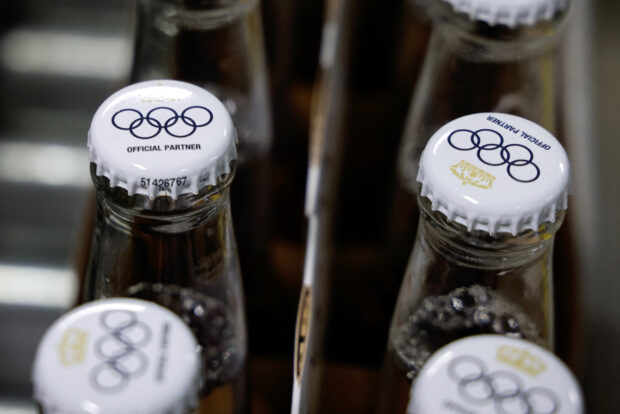Olympic deal shows bubbling market for zero-alcohol beers

This photograph taken on April 23, 2024 shows crown caps covering beer bottles filled with Olympics logo on bottles of Corona Cero alcohol-free beer on a production line during a press visit at the Anheuser-Busch InBev (AB InBEV) brewery in Leuven. AB InBev will be a World Olympic Partner until 2028. Corona Cero alcohol-free beer, thus, becomes a global sponsor of Olympic Games. (Photo by Kenzo TRIBOUILLARD / AFP)
For the first time this summer, as sportswomen and men strive for victory in Paris, spectators will be able to sip the official beer of an Olympic Games.
But the tipple won’t go to their heads: It will be the alcohol-free version of the popular Mexican brand Corona.
ADVERTISEMENT
The breakthrough sponsorship deal, inked by Belgian-Brazilian beer giant AB InBev, is just the latest sign of the fizzing market for zero-alcohol brews.
Bureau of Immigration blocks entry of 25 foreigners at Naia
China’s ‘new model’ on Ayungin Shoal a mere ‘invention’ – NSC
No Chinese presence during West PH Sea trilateral drills – AFP
“All brewers are moving towards alcohol-free or low-alcohol beverages,” Krishan Maudgal, director of the Belgian Brewers Association, told AFP.
That’s the case even in Belgium, where the centuries-old brewing heritage is recognized by UNESCO and the alcohol percentage in beers made by Trappist monks can reach double digits.
“Twenty or 30 years ago, it was more a case of increasing the alcohol content, but now we’ve reversed the trend and are lowering it,” Maudgal said.
Against a backdrop of declining beer consumption — down by 40 percent in 20 years in Belgium — he says producers are “listening to the market” and adapting to drinking habits that have become more responsible.
“Among consumers, there is a trend in favor of moderation and well-being. This trend is happening everywhere,” said Andres Penate, one of the vice presidents of AB InBev, the world’s largest brewer.
“It’s more towards drinking better, drinking less, not about not drinking,” he said.
ADVERTISEMENT
As proof, the brewer — which also makes Stella Artois, Budweiser and Leffe — will double production of its Corona Cero beer at its Belgian plant this year compared to last.
– Big business –
Zero-alcohol beer has been around for decades, but was long derided as a watery version of the real thing.
But as the market has grown, brewers have upped their game and spent big on making their products more palatable.
According to drinks market analyst IWSR, the market for non-alcoholic or low-alcohol drinks, including wine, cider and spirits, is now worth over $13 billion worldwide.
Beer is by far the most popular product among “alcohol-free” fans.
In Europe alone, non-alcoholic beer is worth $3 billion a year, and sales are growing steadily, with Spain and Germany leading the way.
In France, “consumer interest in non-alcoholic beers has been growing for five to ten years, and this is now a fundamental trend,” said Magali Filhue, from the country’s brewers’ association.
Sales now represent around five percent of the beers sold in French supermarkets.
While that percentage remains low, the market is growing steadily.
That’s a bright spot for global brewing giants that have been struggling in recent years.
The Covid pandemic, an energy crisis and inflation have strained the sector, with sales dropping off as consumer spending power has declined.
Last year, AB InBev’s net profit slid by six percent amid a drop in beer sales volumes, particularly in the United States.
Your subscription could not be saved. Please try again.
Your subscription has been successful.
Meanwhile, number two Heineken of the Netherlands this week reported a “difficult and uncertain” outlook for 2024.
EDITORS’ PICK
MOST READ
View comments
